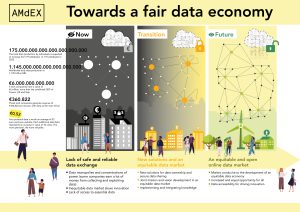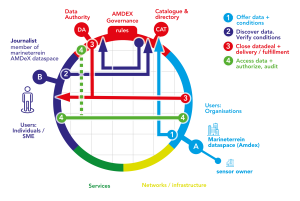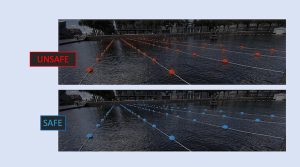AMdEX is defining a role in governance of fair data sharing
The interest in a transparent and controlled way to share or exchange data is growing. While speakers during the AMdEX Meetup #2 presented their progress in the field, questions kept rolling in. The lively online meeting gave participants some inspirational insights.
Willem Koeman, Lead Digital Connectivity at Amsterdam Economic Board, kicked off by giving an overview of what AMdEX is about. And why AMdEX is much needed in helping to ensure a fair data economy.
At the moment, the exchange of data is monopolized by a handful of large players. This results in the five largest corporations representing a combined value of 6,000 billion euro. That amount of money is larger than the gross domestic product of France, Italy and the UK combined. Check the infographic for more insights.
Level playing field
Such monopolies tend to slow down innovation as people feel uncomfortable handing over their data, limiting access to essential data for innovation. AMdEX is working on new solutions to data ownership and trusted sharing in which data owners keeps full control over their data. Organisations and people who are keen on making AMdEX a reality are welcomed to reach out and discuss how they might participate.
AMdEX grid
So what is AMdEX’s role in this and what would such a playing field look like? Hayo Schreijer at deXes breaks down the process by explaining the AMdEX grid.
This shows, much like a public transport map, how AMdEX would contribute to a fair data economy. “A supplier could offer its data and stipulate their conditions for usage in a catalogue. A user would consult this catalogue and see if the data they need, are available and under suitable conditions. If so, they could apply for usage. AMdEX would then check if the supplier’s conditions are met with. For instance: a user might need to be a member of an organisation. Or their goal for usage would need to be approved. Any condition might apply. When AMdEX has verified all boxes are checked, the data deal can be executed.”
Enforcing norms in data exchange
University of Amsterdam researcher Thomas van Binsbergen stipulates that we not only need to specify conditions per dataset. We should be able to translate laws, regulations and social policies into rules that can be digitally enforced. This ensures that both data suppliers and data users can rely on AMdEX.
As such he presents eFLINT, a language that can be used to formalize norms from a large variety of sources. The resulting specifications are executable and supports automatic case assessment, i.e. does this actor adhere to the established norms?
Meanwhile, Marineterrein in Amsterdam is buzzing with sensors collecting all sorts of data. Marineterrein is a ‘Living Lab’, testing ideas that contribute to a sustainable, future proof city. Tom van Arman works here and would love to see an ‘app store for data sets’. He teamed up with AMdEX, to see how the collected data could be made accessible to third parties, such as businesses, artists, local authorities, journalists and residents. He gives very tangible and compelling examples of how AMdEX could make a difference.
Water safety through data
One of the organisations who collect data at Marineterrein, is KWR who are researching water safety. Marineterrein is a popular open water swimming site in the city. KWR checks the water for traces of e-coli bacteria. “With a real-time flow of data in place, KWR could produce float lines with led lights in the swimming area. If the water is safe, they’d be blue. Do the sensors identify a peak in e-coli, then the floaties could turn red”, explains Tom.
Conditions apply
Marineterrein sets a few hands-on criteria for usage of its collected data. “These conditions depend on the data they’re interested in. If a journalist applies for data to publish about those, they’d need to be a member of our Marineterrein community, as well as be a subscriber to AMdEX. Artists may be interested in sound data that Sensemakers has collected. If they want to use those sounds, they should comply with crediting the collectors for their work. When AMdEX has verified the application to these conditions, they supply a link to the requested data.”
Interested in participating?
Would you like to know more about AMdEX and the usecases we’re working on? Find out about the ways you can participate in developing a fair data economy. Maybe you’d consider becoming an endorsing partner? Then contact Willem Koeman directly. Or simply sign up for the AMdEX newsletter and follow us via LinkedIn and Twitter.
7 December 2021
Read more about
Contact us
Want to keep up to date?
Get the best regional news and events (in Dutch) via the Board Update newsletter
Share this news
Want to keep informed?
Follow us daily on LinkedIn and sign up for the Board Update newsletter.
Read more
- Adyen is one of the great success stories of Amsterdam’s tech ...
- Together with enthusiastic partners in three coalitions, the Amsterdam Economic Board is ...
- The top 100 AI tools based in the Amsterdam Metropolitan Area are shown ...




